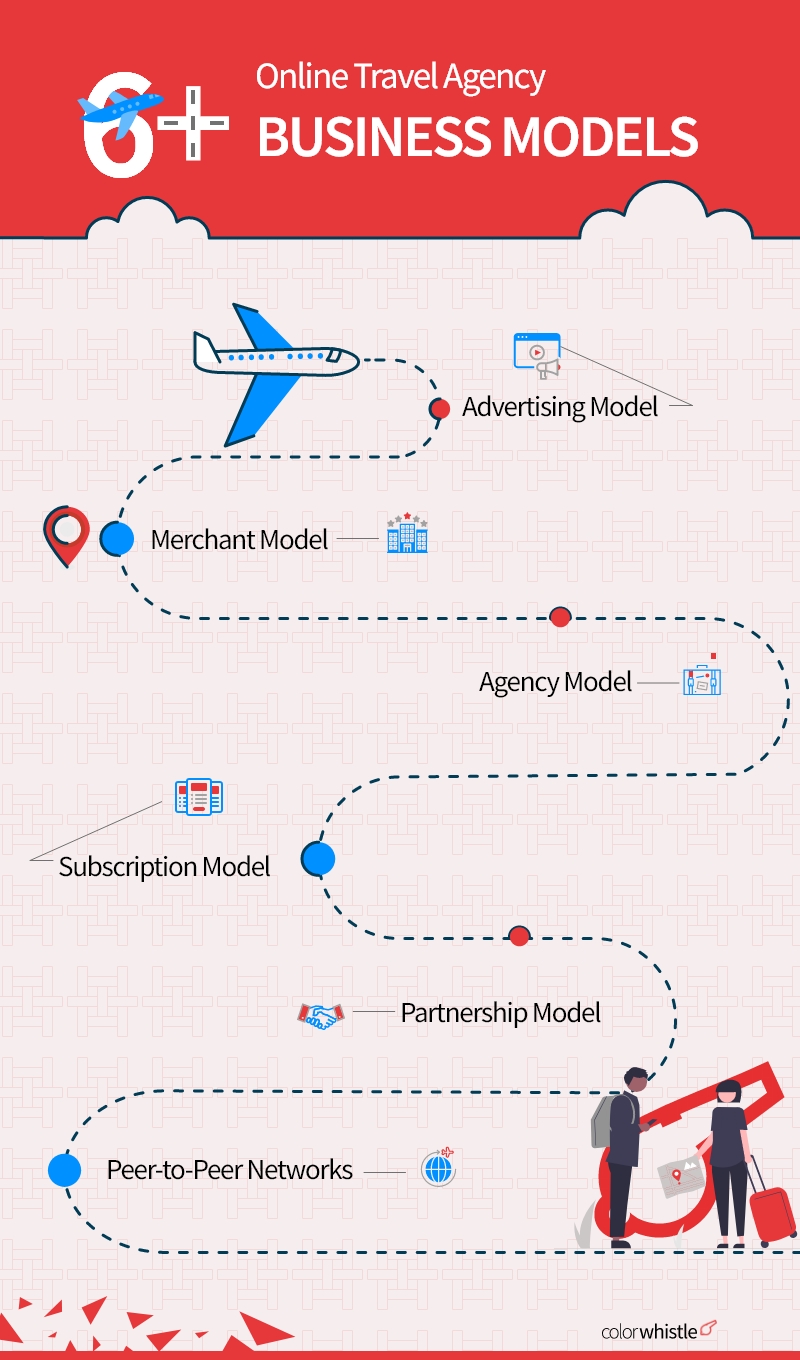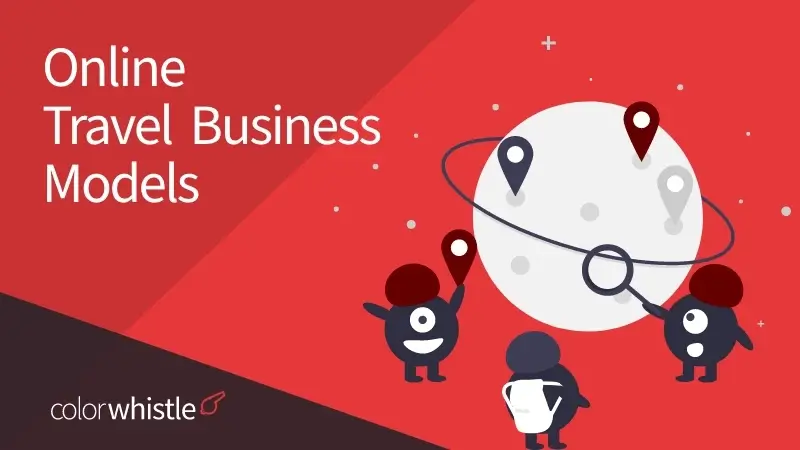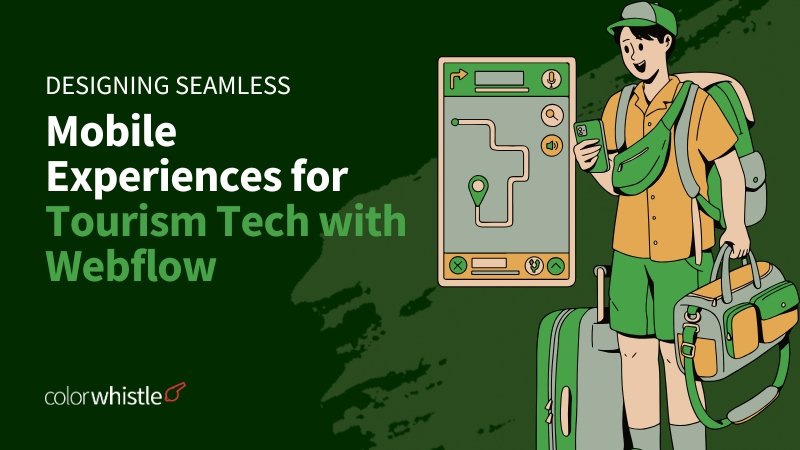“Online travel agency business models” What are these?! Business models that determine how a company generates revenue through the travel and tourism sector, similar to a blueprint. The global online travel market size is expected to generate a revenue of 691 billion U.S. dollars by 2026.
When identification and consolidation of fragmented offers, technological innovations, marketing and advertising techniques, merges with consumer needs, a travel agency would have achieved their first target. Further enhancement and sustenance will depend on their resilience and ability to keep in tune with the changing times.
Looking to transform your website into a revenue-generating online travel agency business model? Hop into our blog and grasp the details on how to conduct SWOT analysis and formulate strategies for generating revenue through the models.
6+ Online Travel Agency Business Models
To attract customers and succeed in this competitive industry, innovative travel agencies offer customized vacation packages, booking, activities, and audiovisual guides. To generate large revenues from their services, most travel platforms employ a variety of business models suiting their objectives.
MakeMyTrip, established in India with a focus on generating revenue from travelers, has achieved remarkable success in a short period of time. Within one year of its inception, the company has established a substantial customer base of over 200,000 satisfied individuals, with daily sales of over 3,000 flight tickets, 300 hotel room nights, and 50 holiday packages.
To learn more on their case study, check out the link.
Let’s get to know some well-known business models that the travel industry keep implementing,

1. Advertising Model
Newspapers, magazines, radio, television, and any other medium where the advertising revenue for the survival of the business. These traditional ways have long been associated with the advertising business model. But, today, most of the online consumers are reluctant to the traditional ways of advertising. Advertising will never go out of style, even as the market becomes more competitive and ad space becomes more valuable.
In the digitalized era, hotels and clients are featured on the website through pages, advertisements, or suggestions and this is considered to be the current advertising model. The client pays the travel website a fee when a user clicks on the link and visits the client’s website (Cost per click – CPC). Another source of income is a cost per thousand impressions (CPM) fee, which is paid by the client based on the number of views.
Tripadvisor is an aggregator website that consolidates hotels, travel destinations, user reviews, and so on. By establishing its base on advertising business model, it has acquired a solid reputation. Currently, more than one billion+ users are visiting the site in a month across 8 million countries. To know more on this, check out the link
Did You Know?
The market size of the global online travel agent industry was $521 billion in 2023, with an estimated growth to $1 trillion by 2030
2. Merchant Model
The merchant model is all the transaction between the property owner and the OTA. Here, the property owner sells the rooms to the OTA at a lower price than the standard, which the OTA sells to the customers and earns revenue. This model aims at selling rooms in bulk without any standardization of the guest profile.
Expedia, a frontier travel-based directory website curating details that includes vacation packages, flights, attraction, and more. The organization runs based on three business models including merchant model, agency model, and advertising model. Among which, the merchant model contributed 64% of its revenue in 2021. To read more on this, click here.
3. Agency Model
The revenue model for the agency is based on per-room revenue. The property owner decides on the prices at which the rooms are sold, and the property owner is solely responsible for the rooms’ maintenance and customer service. Once the guest has checked out of the hotel, the property owner is responsible for paying the commission. This model appears to be financially unprofitable, but it is transparent. This makes it easier for both property owners and customers to trust and rely on the company for their reservations. Property owners find it safe to put their trust in the platform in order to increase their revenue.
Booking.com, a leading online travel marketplace has generated a revenue of $11 billion+ as of 2021-2022. The agency model followed by the organization has the major contribution to the revenue. But, to make a note of, oBooking.com has shifted from the agency model to merchant model. To explore on this, check out the site.
Also Read
4. Subscription Model
In this model, hotels and resorts partner with travel agencies and users can view descriptions and contact information for the hotels on the website. Customers prefer to plan their entire trip from the comfort of their own homes, so airlines, local taxis, and other businesses have partnered with these agencies. Customers tend to book vacations only once or twice a year, so subscriptions are a necessary revenue stream for any travel startup.
5. Partnership Model
This model is all about partnering with social travel platforms, which can provide a much-needed recurring revenue stream. On social media platforms, users interested in visiting a specific destination can get advice, descriptions, and reviews from other travelers. Due to this, many online travel agencies and booking platforms are looking to partner with these social travel platforms with large communities in order to grow their customer base and stay ahead of the competition.
Did You Know?
By 2028, online sales are projected to make up 76% of all revenue in travel and tourism
6. Peer-to-Peer Networks
This works on the concept of sharing. Here, the websites aim to foster a sharing economy by connecting travelers with property owners who are willing to rent rooms or houses for the duration of their stay. They provide a booking portal for these rooms and charge both the buyer and the seller a commission. They are more popular than vacation packages because they provide affordable and flexible travel options.
Reputed Travel Agencies and Their Business Model,
- TripAdvisor – Advertising Model
- Booking.com – Agency and Merchant Model
- Expedia – Merchant Model
- MakeMyTrip – Subscription Model
- Airbnb – Peer to Peer
- Vrbo– Peer to Peer
Strength and Weakness of Travel Industry (SWOT Analysis)
Strengths
Strengths are the aspects through which you can understand the market advantage and can be used in leveraging the market plan.
Some strengths of the travel industry are,
- A well- constructed website projecting the quality of service you offer
- The safety services that you offer in and around your environment would attract more tourists to your place
- Offering different types of accommodations for various categories of tourists
- Offering quality services and products would bring in more customers
- Providing traveling convenience with strong infrastructure, roads, airport, and other amenities would attract more tourists to that place
Weakness
Weakness would always make it harder to maximize the opportunities and vulnerable to threats. Every travel agency would have inherent weakness, referring only to the internal issues.
Some weakness of the travel industry are,
- Tourism is a combination of different businesses, and the main objective should be the growth of the travel industry. Since different businesses have their own goals, it is essential to have good and professional management skills. If not managed properly, it is quite difficult to achieve your goals
- If you have lack of innovation and creativity in different categories like transport, luxury, restaurants, etc. and if a coherence is missed among them then, it would affect the growth of the industry
- Providing less quality services
- High employee turnover as the employees are engaged more with less pay
- Less investment for training and developing the employees
- Still depending upon traditional/conventional marketing strategies, though the technology development is growing every day
Opportunities
Opportunities are external, and they provide the company all possibilities to take advantage of them. It is essential to choose the most potential opportunity and is also critical.
Some opportunities of the travel industry are,
- Instead of offering collective services to your customers, try offering personalized services which would make your customers appealing
- Choose an unusual spot, establish a good place which would attract more tourists
- Be very cautions about the environment, ensure to establish an eco-friendly environment attracting tourists
- Implementing the best suitable online marketing strategies would increase your visibility and bring in more tourists
Threats
Threats are also external to the travel agency. It could be a pandemic, a new competitor, natural disasters, conditions that would change your local community, bad economy and more. Any of these would affect the industry and would freeze its ability to explore opportunities and grow.
Some threats of the travel industry are,
- The lockdown or shutdown of the business during the pandemic
Environmental issues affect the industry and even the tourism industry is affecting the environment - Political chaos creates marketing uncertainty
- Economic recession has created a great impact on the industry
- Highly competitive industry
- Your competitor would have affiliated with a large industry franchise
How a Travel Agency Needs to Understand the Industry?
Understanding The Market
- The industry being a competitive one, and already the leading players have conquered the market by growing their share. It is essential to establish your travel agency with a specific niche to stay afloat.
- If you are a new travel agency, you have to work hard to gain tourists’ trust
- Need to put a lot of effort to improve the visibility of your travel agency
- You can be destination specific, here, you target a region and offer some unique deals and services that are not provided by the dominating service providers
- Pricing is the main consideration for travelers. Most of the travel agencies compete by price, and it is also essential that you surpass the leading OTAs in terms of pricing
- You can narrow down your travel agency strategies by focusing on specific region, budget-friendly, various packages, family/solo travelers and more
- Establishing your travel website with satisfying user experience by offering unique and powerful engine like non-interlined flights, creating quite complex itineraries with multiple stops
- Understanding the market also includes analyzing your competitors. Examining their products and services, would help in pinpointing your lags and the areas that need improvements
Also Read
Investigating On Your Target Audience
- Investigate and recognize who your travelers are? Understand their demographics, which would help in narrowing down the strategies
- Look for the travelers’ search patterns while booking tickets/hotels. Collect information on how travelers’ approach travel websites? This would help you in understanding the distribution channels
- Analyzing how often your target audience travels? / how price sensitive they are?. This information would help you to narrow down and implement the suitable strategies to attract more costumes to your travel agency
- This would help in understanding your audience’s behavior and also creating a user persona would help in approaching them with your team
Revenue Boosting Strategies For Your Travel Agency Business
To help your travel business to function out of the box and to generate more revenue, here, are some strategies that you can implement today—or plan for once your business is up and running
- Implement customer referral programs, this would generate more revenue by attracting more tourists
- Increase your visibility in the social media platforms
- Offer personalized discounts and packages after analyzing your tourists
- Encourage your customers to leave reviews
- Know your audience properly
- Develop a great relationship with your customers by engaging them
- Create a blog room, from where readers can get to know about beautiful destinations and also about the fascinating experience of other travelers
Drive Conversions and Boost your Business with Expert Travel Website Development.
Choose the Model that is Right for Your Online Travel Agency
These are some of the most common online travel agency business models, but there are many variations and combinations of these models in the travel industry. The choice of business model depends on factors such as the agency’s goals, target audience, and the types of travel services offered. Plan towards establishing an optimized travel business by keeping in mind the factors that have been discussed in this article.
Do you have an innovative idea for establishing your travel business? Are you confused about deciding a suitable business model? or planning for a travel web app?
Do contact ColorWhistle for professional assistance by sending a message or call us at +1 (210) 787-3600, we’ll get back to you at the earliest. We provide services tailored to your requirements that suit your business model.
In quest of the Perfect Travel Tech Solutions Buddy?
Be unrestricted to click the other trendy writes under this title that suits your needs the best!
What’s Next?
Now that you’ve had the chance to explore our blog, it’s time to take the next step and see what opportunities await!






thanks for valuable information
Greetings! Very helpful advice within this article! It is the little changes that produce the largest changes. Many thanks for sharing!
very good information about travel needs